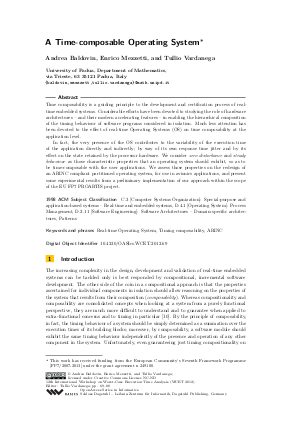A Time-composable Operating System
Authors Andrea Baldovin, Enrico Mezzetti, Tullio Vardanega
-
Part of:
Volume:
12th International Workshop on Worst-Case Execution Time Analysis (WCET 2012)
Part of: Series: Open Access Series in Informatics (OASIcs)
Part of: Conference: Workshop on Worst-Case Execution Time Analysis (WCET) - License:
 Creative Commons Attribution-NonCommercial-NoDerivs 3.0 Unported license
Creative Commons Attribution-NonCommercial-NoDerivs 3.0 Unported license
- Publication Date: 2012-07-10
File

PDF
OASIcs.WCET.2012.69.pdf
- Filesize: 495 kB
- 12 pages
Document Identifiers
Subject Classification
Keywords
- Real-time Operating System
- Timing composability
- ARINC
Metrics
- Access Statistics
-
Total Accesses (updated on a weekly basis)
0PDF Downloads0Metadata Views
Abstract
Time composability is a guiding principle to the development and certification process of real-time embedded systems. Considerable efforts have been devoted to studying the role of hardware architectures - and their modern accelerating features - in enabling the hierarchical composition of the timing behaviour of software programs considered in isolation. Much less attention has been devoted to the effect of real-time Operating Systems (OS) on time composability at the application level. In fact, the very presence of the OS contributes to the variability of the execution time of the application directly and indirectly; by way of its own response time jitter and by its effect on the state retained by the processor hardware. We consider zero disturbance and steady behaviour as those characteristic properties that an operating system should exhibit, so as to be time-composable with the user applications. We assess those properties on the redesign of an ARINC compliant partitioned operating system, for use in avionics applications, and present some experimental results from a preliminary implementation of our approach within the scope of the EU FP7 PROARTIS project.
Cite As Get BibTex
Andrea Baldovin, Enrico Mezzetti, and Tullio Vardanega. A Time-composable Operating System. In 12th International Workshop on Worst-Case Execution Time Analysis. Open Access Series in Informatics (OASIcs), Volume 23, pp. 69-80, Schloss Dagstuhl – Leibniz-Zentrum für Informatik (2012)
https://doi.org/10.4230/OASIcs.WCET.2012.69
BibTex
@InProceedings{baldovin_et_al:OASIcs.WCET.2012.69,
author = {Baldovin, Andrea and Mezzetti, Enrico and Vardanega, Tullio},
title = {{A Time-composable Operating System}},
booktitle = {12th International Workshop on Worst-Case Execution Time Analysis},
pages = {69--80},
series = {Open Access Series in Informatics (OASIcs)},
ISBN = {978-3-939897-41-5},
ISSN = {2190-6807},
year = {2012},
volume = {23},
editor = {Vardanega, Tullio},
publisher = {Schloss Dagstuhl -- Leibniz-Zentrum f{\"u}r Informatik},
address = {Dagstuhl, Germany},
URL = {https://drops.dagstuhl.de/entities/document/10.4230/OASIcs.WCET.2012.69},
URN = {urn:nbn:de:0030-drops-35589},
doi = {10.4230/OASIcs.WCET.2012.69},
annote = {Keywords: Real-time Operating System, Timing composability, ARINC}
}
